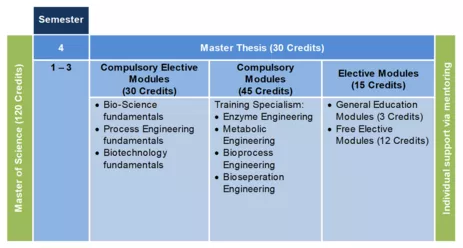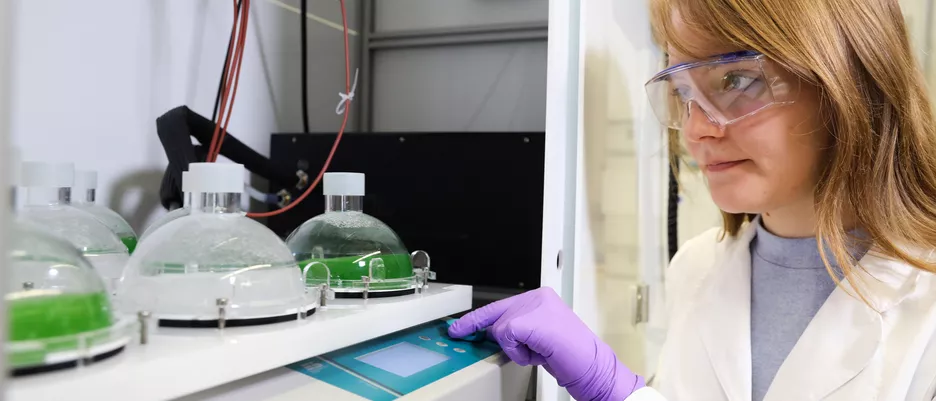Industrial Biotechnology M. Sc.
Manufacture plastics from carbon dioxide (CO2), silk using bacteria and renewable resources or liquid fuels from organic waste? The Industrial Biotechnology program deals with the industrial production of substances with the help of new biocatalysts and biotechnological procedures.
As a highly interdisciplinary field, "white biotechnology" comprises the biosciences (molecular biology, biochemistry, microbiology and bioinformatics) on the one hand. On the other hand, methods of (bio)process engineering and technical chemistry are required in order to realize the full potential of the new biocatalysts and to develop sustainable production processes on an industrial scale. As a future technology of the third millennium, IBT is considered to be of outstanding importance, especially for the European economy.
With the Research Center for White Biotechnology on the Garching campus, the Technical University of Munich (TUM) is creating a strong, interdisciplinary research and training program in this field.
What you'll learn for your future?
The master's program in Industrial Biotechnology aims to provide scientists with a vocational education and training that incorporates broad and pertinent knowledge of methodologies and the discipline. The goal is to train highly qualified specialists able to design and implement new biological processes required in industrial production processes on the interface between the biosciences and process engineering.
Graduates will have complemented, and expanded upon their previous knowledge of the natural sciences and of engineering and, in addition, possess advanced specialist knowledge in the areas of enzyme engineering, metabolic engineering, bioprocess engineering, and bioseparation engineering.
Opportunities arise for graduates across the full spectrum of bioprocess development and optimization, from the laboratory to the industrial production. In addition to the chemical industry, potential fields of occupation also include the biotechnological sector, plant and apparatus engineering, the pharmaceutical industry, and environmental engineering.
The Master degree program in Industrial Biotechnology at the TU Munich is a pioneer in Europe and offers the best qualification opportunities for this job market.
More information on the M.Sc. Industrial Biotechnology can be found on our TUM IBT Wiki.
Type of Study: Full Time
Standard Duration of Studies: 4 Semester
Credits: 120 ECTS
Main Locations: Garching
Admission Category: Aptitude Assessment for Master
Start of Degree Program: Winter Semester, Summer Semester
Application Period: Winter semester: 01.04. – 31.05. and Summer semester: 01.11. – 15.01.
Required Language Proficiency: German
Tuition Fees: for Students from Non-EU Countries
The standard duration of the Master degree program in Industrial Biotechnology is 4 semesters. Overall, the study program encompasses 120 ECTS, which are divided into 90 ECTS for modules (consisting of courses such as lectures, seminars, tutorials, and practical courses) and 30 ECTS for the Master's Thesis. 45 ECTS in mandatory modules and 30 ECTS in compulsory elective modules as well as another 15 ECTS in elective modules are to be earned. Each semester 30 ECTS should be achieved.
During the first two semesters, science and engineering graduates are taught the interdisciplinary fundamentals. Choosing from a list of required elective modules, students themselves put together the semesterized curriculum, which has been adapted to the bachelor’s degree, with the help of a mentor.
- Bioscience fundamentals: Students with a bachelor’s degree in engineering gain an understanding of bioscience fundamentals.
- Process engineering fundamentals: Students with a bachelor’s degree in science are taught the engineering fundamentals of process engineering.
- Biotechnology fundamentals: Students with a bachelor’s degree in bioprocess engineering are taught the biotechnology and engineering fundamentals.
The list of mandatory and elective modules refers to the module handbook and the statute of the Master's Program Industrial Biotechnology, dated June 13, 2019. Exemplary lists of the subject modules to choose from can be found on our Wiki.
Starting in the 2nd and 3rd semester, this is supplemented by subject-specific training in the mandatory focus areas, i. e. enzyme engineering, metabolic engineering, bioprocess engineering, and bioseparation engineering.
Through elective modules in the first three semesters, there is also the possibility of expanding one's own competence profile with modules from a wider range of courses offered by the TU Munich or another university.
Students pursue their master’s thesis in the fourth semester, ideally after they have passed all module exams. This independent, academic work is based on a topic relevant to industrial biotechnology and is supervised by a professor or any expert supervisor of the TU Munich who is a member of the departments involved in the study program.
During the study program, there is the possibility to include an (international) research internship in the study plan (max. 10 ECTS). Industrial internships are also supported but cannot be incorporated into the curriculum. Evonik Nutrition & Care offers internships especially for students in the IBT Master’s program.

During your studies at the TU Munich, you have the opportunity to study abroad for up to two semesters or to complete an internship abroad. You can find more details about the different programs on the TUM Global website.
On the IBT program, you can spend time abroad at the TU’s partner universities in various European countries as part of the Erasmus+ program. With the exchange program TUMexchange you have the opportunity of spending some time at a partner university outside Europe, i. e. in Africa, Asia, Australia, North or South America.
Please apply through the TUMonline application portal and upload your application documents.
Students must prove their eligibility for the Industrial Biotechnology master’s degree program by a B. Sc. degree that has been earned over at least six semesters at a university in Germany or overseas or a degree of at least equal value in biochemistry, (molecular) biotechnology, biology, bioprocess engineering, chemical engineering, energy and process engineering, engineering science, chemical biotechnology, or comparable study programs.
Upon receipt of a reasoned request, students who have earned at least 140 credits in one of the above-mentioned bachelor’s programs, may be accepted to the master’s program. Proof of graduation with a bachelor’s degree must be furnished within one year after the start of the master’s program.
Applicants who have earned a bachelor’s degree overseas must submit a language certificate by the end of the application period.
Application period for the winter semester: 01.04. – 31.05.
Application period for the summer semester: 01.11. – 15.01.
If you receive an offer of admission, you will additionally have to submit individual documents as notarized hardcopies by post in order to be enrolled.
More information regarding the application and application documents can be found on the following pages: Wiki, Master's Degree Programms at TUM.
In general, applicants with a qualification for postgraduate studies (e.g. a bachelor’s) obtained outside of the EU / EEA must have their documents reviewed in advance through uni-assist.
A two-stage assessment test procedure is used to decide on admission to the Industrial Biotechnology program. Information on details of the aptitude assessment and procedure can be found in the FPSO M.Sc. Industrial Biotechnology.
Assessment procedure
In the first stage of the assessment test procedure, an assessment is carried out based on the following criteria:
- Average grade of your bachelor's degree or performance certificate
- Expert qualification based on the subject catalogue of your bachelor’s degree
- Letter of motivation
Subject specific qualifications are assessed by a scoring system, in which the qualifications of the applicant are compared with the qualifications of a TUM graduate from a comparable program of study. Hereby, the learning objective and the workload (ECTS) of the individual modules are taken into account.
Excellent and good candidates will be admitted within the first stage of the application procedure. Candidates who do not meet the requirements will be rejected directly. If and when the result is not clear-cut within the first stage of the application procedure, candidates will be asked go through a second round of assessment tests.
In the second stage of the assessment test procedure, applicants are invited for a personal interview of about 20 minutes. Both the average grade of the bachelor's degree certificate and the result of the personal interview are equally decisive for the final qualification of the applicant. The aptitude interviews for the winter semester take place at the beginning of July and for the summer semester at the beginning of March. The invitation to the interview will be sent by email at least one week before the interview date.
